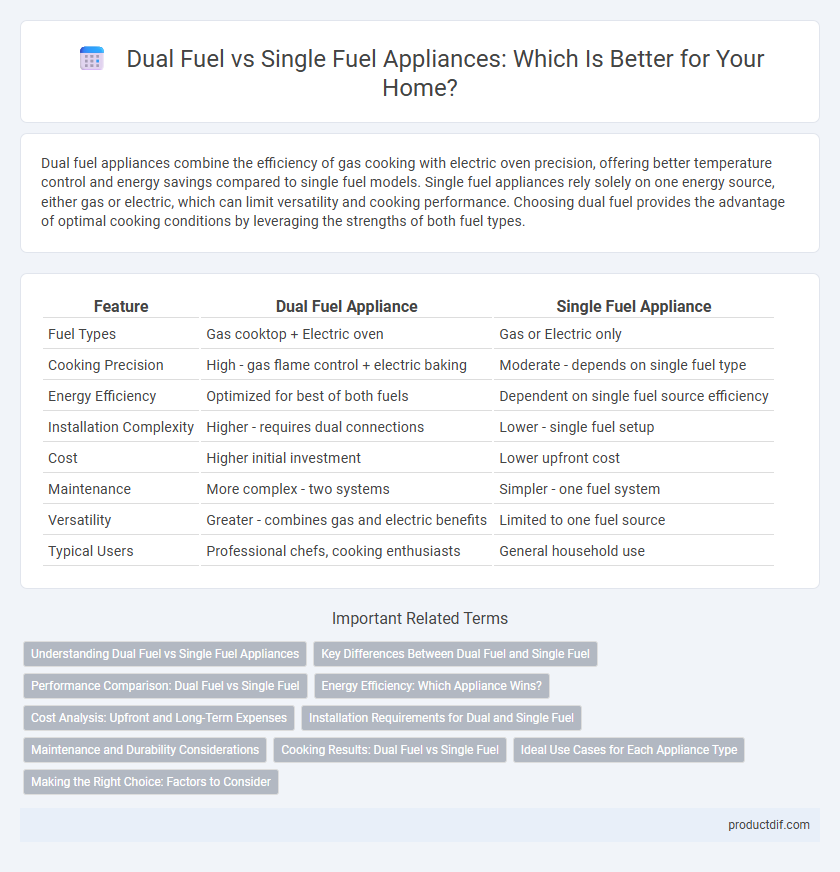Dual fuel appliances combine the efficiency of gas cooking with electric oven precision, offering better temperature control and energy savings compared to single fuel models. Single fuel appliances rely solely on one energy source, either gas or electric, which can limit versatility and cooking performance. Choosing dual fuel provides the advantage of optimal cooking conditions by leveraging the strengths of both fuel types.
Table of Comparison
| Feature | Dual Fuel Appliance | Single Fuel Appliance |
|---|---|---|
| Fuel Types | Gas cooktop + Electric oven | Gas or Electric only |
| Cooking Precision | High - gas flame control + electric baking | Moderate - depends on single fuel type |
| Energy Efficiency | Optimized for best of both fuels | Dependent on single fuel source efficiency |
| Installation Complexity | Higher - requires dual connections | Lower - single fuel setup |
| Cost | Higher initial investment | Lower upfront cost |
| Maintenance | More complex - two systems | Simpler - one fuel system |
| Versatility | Greater - combines gas and electric benefits | Limited to one fuel source |
| Typical Users | Professional chefs, cooking enthusiasts | General household use |
Understanding Dual Fuel vs Single Fuel Appliances
Dual fuel appliances combine gas and electric power sources, offering precise temperature control and energy efficiency for cooking or heating. Single fuel appliances rely solely on one energy type, either gas or electricity, which can limit versatility but simplify installation and maintenance. Understanding the benefits of each helps consumers choose appliances that best fit their energy preferences and cooking styles.
Key Differences Between Dual Fuel and Single Fuel
Dual fuel appliances combine gas and electric power sources, offering greater versatility and energy efficiency compared to single fuel appliances that rely solely on either gas or electricity. Key differences include cooking precision and cost-effectiveness, where dual fuel ovens provide the advantage of electric ovens for baking and gas cooktops for rapid heat adjustment. Single fuel units are generally simpler and less expensive but may lack the performance flexibility found in dual fuel systems.
Performance Comparison: Dual Fuel vs Single Fuel
Dual fuel appliances combine gas and electric power sources, offering superior temperature control and faster cooking times compared to single fuel models that rely on only one energy source. Performance improvements in dual fuel ranges include enhanced precision in baking and searing due to electric ovens paired with gas cooktops, delivering consistent heat distribution and efficiency. Single fuel units provide simplicity and often lower upfront costs but lack the versatile cooking capabilities and energy optimization of dual fuel systems.
Energy Efficiency: Which Appliance Wins?
Dual fuel appliances often outperform single fuel units in energy efficiency by utilizing the optimal energy source for each cooking method, such as gas for stovetop precision and electricity for oven consistency. Single fuel appliances typically rely on one energy type, which can limit efficiency depending on the cooking task and fuel costs. Energy efficiency ratings and fuel cost comparisons consistently show that dual fuel systems can reduce overall energy consumption and utility expenses in household kitchens.
Cost Analysis: Upfront and Long-Term Expenses
Dual fuel appliances often have higher upfront costs due to the integration of both gas and electric components, but they can offer long-term savings through improved energy efficiency and fuel flexibility. Single fuel appliances generally have lower initial expenses but may incur higher operating costs depending on fuel prices and energy consumption patterns. Evaluating local utility rates and appliance usage is crucial for determining the most cost-effective option over the appliance lifespan.
Installation Requirements for Dual and Single Fuel
Dual fuel appliances require separate gas and electric connections, necessitating more complex installation processes and professional expertise to ensure safety and compliance with local codes. Single fuel appliances, using either gas or electric power exclusively, typically involve simpler installation with fewer connection points, reducing setup time and potential complications. Proper installation for both types must adhere to manufacturer guidelines and safety standards to ensure optimal performance and durability.
Maintenance and Durability Considerations
Dual fuel appliances typically require more frequent maintenance due to the complexity of integrating gas and electric components, increasing the potential for wear and calibration issues. Single fuel systems generally offer greater durability with fewer parts prone to failure, simplifying repairs and extending appliance lifespan. Opting for a single fuel appliance can lead to lower long-term maintenance costs and enhanced reliability in daily use.
Cooking Results: Dual Fuel vs Single Fuel
Dual fuel cookers combine gas burners with an electric oven, delivering precise temperature control and even heat distribution, which results in consistently superior cooking and baking outcomes. Single fuel cookers, using either gas or electric for both cooking and baking, may excel in specific tasks but often lack the versatility and consistent temperature accuracy found in dual fuel systems. Professional chefs and avid home cooks favor dual fuel appliances for their ability to achieve optimal searing, simmering, and baking results in one versatile unit.
Ideal Use Cases for Each Appliance Type
Dual fuel appliances combine gas and electric power sources, making them ideal for households that want precise temperature control and energy efficiency in cooking or heating. Single fuel appliances rely solely on one energy type, such as gas or electric, and are best suited for users seeking straightforward installation and maintenance with consistent fuel availability. Choosing between dual fuel and single fuel depends on kitchen setup, budget considerations, and desired cooking performance.
Making the Right Choice: Factors to Consider
Choosing between dual fuel and single fuel appliances depends on factors such as cooking preferences, energy efficiency, and fuel availability. Dual fuel ranges offer the precision of gas cooktops combined with the even heating of electric ovens, ideal for culinary versatility. Single fuel appliances, either gas or electric, provide simplicity and cost-effectiveness but may limit cooking techniques and energy options.
Dual fuel vs Single fuel Infographic

 productdif.com
productdif.com